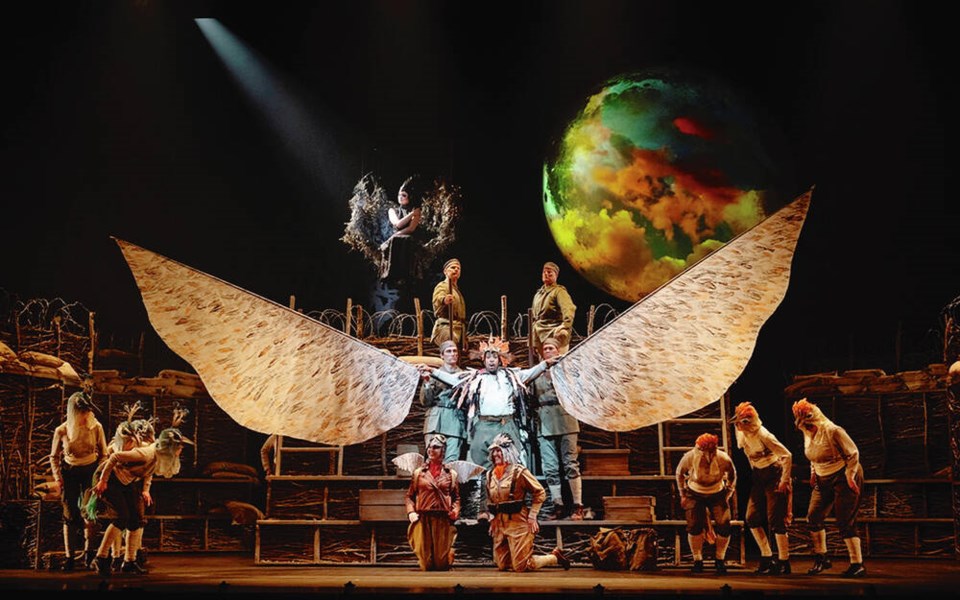The song of Walter Braunfels went silent for decades, thanks partly to Nazi persecution. Now, thanks entirely to Pacific Opera Victoria, his half-forgotten opera The Birds has made its Canadian debut.
POV’s production, continuing at the Royal Theatre Sunday and Tuesday, is a whiz-bang spectacular. The score is gorgeous, although some may find it musically conservative (one critic deemed the opera “comfort music”). The circus-like visuals are striking — often breathtaking, sometimes bordering on kitsch.
Will you be entertained? Yes. Is it worth seeing? Oh, yes.
If you’re like me, you hadn’t heard of Walter Braunfels, a German composer who fell into obscurity for decades. His is a curious story.
The Birds (or Die Vögel) was a smash hit when it premièred in Munich in 1920. Braunfels was persecuted by the Nazis after it was discovered he had Jewish lineage. When the composer returned to the public eye after the Second World War he found his music — very much in the German classical-romantic tradition — had fallen out of fashion.
By the 1970s The Birds was starting to be revived.
The Birds takes inspiration from an ancient Aristophanes play. Two men go in search of a happier world among the birds. One of them persuades the winged ones to build a city in the sky. The avian population agrees — but man-made problems set in. A war is fought; Greek gods are angered.
This production is set behind German lines in 1918. It opens with the howl of a mortar shell. Soldiers languish behind barbed wire and sandbags. Enter intrepid mortals Hoffegut (tenor Adrian Kramer) and Ratefreund (baritone Peter Barrett) — and the fun begins.
We’re treated to a visual feast, courtesy of designers Pam Johnson (set), Nancy Bryant (costumes) and Eric Champoux (lighting). A massive disc looming over the stage is home to myriad projections such as a winking silver moon and an army of birds. The overall look is big and bold. Giant red poppies pop up, jumbo puppets stalk the stage, bird king Hoopoe (baritone Justin Welsh) boasts a wing-span covering half the stage.
This approach works much of the time; sometimes it seems overwrought. The entrance of two giant puppets representing a flamingo and an ostrich is certainly eye-popping. Yet when the pair get married and push a bird-baby carriage (the audience loved this) things seemed to be winging their way to cuckoo-land.
There are numerous scenes of breath-taking beauty. Coloratura soprano Claire De Sévigné, who plays the Nightingale, dominates many of these.
We meet her rising slowly through the air in a black sequined costume with a plumed headdress — a celestial entering a world of melancholy. On opening night Sévigné looked like some mysterious apparition from the 1920s — and her singing was enchanting. The Nightingale song tips its beak to Mozart’s trilling Queen of the Night aria. Birdlike in nature, it’s replete with treacherously difficult high notes. Sévigné navigated this with aplomb, revealing a clear and lustrous timbre.
The dramatic heart of The Birds surfaces in Act II. The Nightingale offers a haunting aria, then is joined by Hoffegut for a love duet. It’s all very romantic and Germanic, with Hoffegut rhapsodizing about dreaming in a moonlit forest beside brooding mountains. Kramer (Hoffegut) sang this tremendously well, displaying vocal heft as he conjured up a tortured soul both valiant and humbled.
Also notable was bass-baritone Kyle Albertson, who impressed with his powerful interpretation of Prometheus. Indeed there was good singing throughout.
Hard work and attention to detail always shows on stage. Johnson’s set is wonderfully imaginative. The chorus transforms convincingly into a flock thanks to birdlike movements and feathery costumes. Director Glynis Leyshon’s unerring ability for making a stage shudder into life keeps us entertained — even through an over-long second act. Conductor Timothy Vernon leads the Victoria Symphony through a score that is lush, lyrical and nuanced.
***
For those who love nasty humour, there’s horrible fun afoot at Theatre Inconnu.
The Fernwood company has launched its 36th season with Bull by English playwright Mike Bartlett. The 65-minute play is a bracing evisceration of office politics.
Bull has a trio of young office workers squaring off as they wait for the boss to sack one of them. Two set upon the weakest one like bullfighters tormenting their prey with a thousand tiny cuts.
The victim is Thomas (James Johnson), a socially awkward fellow. He’s first set upon by Isobel (Rebecca Elliott) who immediately tries to destroy his confidence. There’s something stuck in his hair, she says, and his suit looks rather cheap.
“You really are a b—ch,” declares Thomas.
“That is allowed, expressing my opinion… Your suit counts against you,” replies Isobel.
And so the gas-lighting begins. Isobel is joined by Tony (Nolan Fidyk), a loutish alpha-male who enters marathons only because he wants to have sex with the female organizers. Alan Penty plays the boss, who naturally sides with the bullies.
No one pulls off lacerating social satire like the Brits. Bartlett’s razor is every bit as sharp as that of Stephen Berkoff, Harold Pinter, Ricky Gervais and Succession creator Jesse Armstrong.
Tuesday’s preview showcased a well-rehearsed cast. As Thomas, Johnson’s quirky likeability worked in his favour, although he might dig deeper into the role. Elliott captured Isobel’s deadpan inhumanity; Fidyk brought out Tony’s unctuous hyper-masculinity.
Don Keith’s direction is able, although on this night the tone and pacing were sometimes off. Given Bull’s surreal exaggeration of social interaction, the production might benefit from a more heightened and stylized treatment.
Bull continues to March 11.



